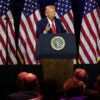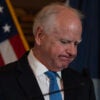With millions of students at home as the result of coronavirus district closures, and families finding themselves thrown into “unexpected homeschooling,” Americans rightly expect that teachers, administrators, and principals at all types of schools would be embracing an “all hands on deck” approach to this challenging situation.
But while instances of cooperation between public and private schools, charters, and virtual academies abound, unfortunately, so does the continuation of education politics as usual.
The Wall Street Journal reports that, “under pressure from the unions,” the Oregon Department of Education is now preventing students from transferring to the state’s virtual public charter schools.
Many families in Oregon sought to enroll their children in virtual charter schools when the brick-and-mortar public schools closed their doors on March 16.
But the Oregon Education Association convinced the state to halt any further transfers to virtual charter school, blocking enrollment of 1,600 students at Oregon Connections Academy alone.
There’s more hopeful news out of Alaska. Students there could soon be the beneficiaries of a partnership between their state and the Florida Virtual School. The online provider has signed a contract to offer courses to Alaskan students who cannot access their now shuttered public schools, the Anchorage Daily News reports.
As Alaska Education Commissioner Michael Johnson put it, “While the world around us is scrambling with uncertainty, I believe our students and teachers can and will re-imagine teaching and learning.”
Johnson’s right. Yet the teachers union in Alaska is also trying to put the deep freeze on education access. It stands firmly opposed to the partnership, in part because it hasn’t been vetted by “Alaska education professionals.”
The union apparently believes nothing is better than something that hasn’t been blessed by their professional “experts.”
What is really at the heart of the special interest groups’ opposition? We find a blunt answer in Alaska: the union is afraid the online learning option will remain a permanent feature of the Alaskan education landscape. And it isn’t alone.
The Los Angeles teachers union is resisting efforts by the Los Angeles Unified School District to have teachers move instruction online during the pandemic.
The Pennsylvania Legislature, acting under pressure from unions, has cut off tuition for any additional enrollees at the states’ cyber charter networks, which are now scrambling to serve the surge of students for free.
The political obstacle course is all the more disappointing because this could be a time of great cooperation and cross-pollination of best practices between traditional public schools and those that, by the nature of their model, are better prepared for this disruptive crisis.
Some virtual schools have offered free distance learning instruction to districts, and dozens of educational technology companies are offering their products heavily discounted or entirely gratis, but few have taken them up on the offer.
Turf wars are not the only political barrier impacting instruction during the coronavirus crisis. In states as diverse as California, Kentucky, and Washington, districts are choosing not to offer instruction online at all because not every student will be able to access the lessons.
Instead of finding creative ways to deliver internet services to disadvantaged families as some New York charter networks are doing, these districts are ceasing instruction for the majority of students who would otherwise be able to continue learning, ensuring that everyone falls behind.
Just as the nation faces dark weeks and months ahead, the coming year will be difficult and turbulent for students, families, teachers, and schools.
For the education sector, the problems will continue long after the virus is largely defeated, as school systems face large budgetary shortfalls due to reduced tax revenue. In facing these challenges, our priority should be to keep students learning as much as is possible.
Delivering continued education and support to students and families during this time will take cooperation, creativity, and a heavy dose of pragmatism, not retreads of pre-crisis political debates.































